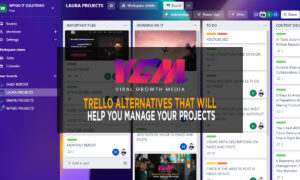You may have heard of NetSuite if you’re seeking a complete business management system. It is a well-liked option for companies of all sizes and sectors. It’s not the only choice available, though. We shall examine the top NetSuite rivals and alternatives in this blog post. We’ll examine what they each have to offer and assist you in selecting the best one for your company.
-Sage Intacct:
It is a cloud-based financial management program with capabilities comparable to NetSuite’s. It is focused primarily on small and medium-sized firms, though. Sage Intacct gives you real-time access to your financial data to confidently run your business.
Oracle ERP Cloud:
Another well-liked option for companies looking for NetSuite alternatives. The enterprise resource planning (ERP) applications it provides are very comprehensive. With Oracle ERP Cloud, businesses may automate their supply chain, human resources, and financial activities.
Acumatica:
a cloud-based enterprise resource planning (ERP) program with capabilities comparable to NetSuite. Because it is scalable, Acumatica can expand along with your business. It offers various services, including project accounting, customer relationship management (CRM), and financial administration.
Microsoft Dynamics 365 Business Central:
It is a cloud-based business management tool that provides functionality comparable to NetSuite’s. Small and medium-sized organizations can use Microsoft Dynamics 365 Business Central. It aids organizations in automating their supply chain, financial, and human resource procedures.
Infor CloudSuite:
is an enterprise resource planning (ERP) tool that runs in the cloud and has functionality akin to NetSuite’s. All sizes of enterprises can use Infor CloudSuite. It aids organizations in automating their supply chain, financial, and human resource procedures.
Even though NetSuite has gained a lot of traction in the enterprise resource planning (ERP) market, some companies do not want to utilize it because they do not use the entire Oracle stack or require a less complex or more affordable ERP solution. Check out these five rivals if you’re seeking for an alternative to Oracle NetSuite.

These are five Oracle NetSuite competitors;
-SAP ERP
With functionalities for accounting, customer relationship management, human resources, supply chain management, and inventory management, SAP’s enterprise software competes directly with Oracle.
Additionally, SAP’s software is built on its HANA computing platform, which offers automation machine learning and predictive analytics as a capstone.
The steep learning curve of this level of intricacy makes even seasoned users feel intimidated by SAP’s extensive options. Smaller businesses would be better off with one of the less complicated and expensive options discussed in this article than SAP’s small– and medium-sized ERP platform solutions.
Sage X3:
Sage X3 is a full-featured business management system that provides all the tools and features organizations need to manage their finances, supply chains, and operations. For businesses in manufacturing, distribution, and other difficult areas, Sage X3 is an excellent NetSuite substitute. Real-time visibility into a company’s finances, inventories, and activities is possible. Companies may swiftly and efficiently make well-informed decisions about their business using Sage X3.
Sage X3 is accounting software that lets you keep tabs on your business’s finances. It offers features that make it especially user-friendly, such as the flexibility to produce and alter financial reports. Its reasonable pricing depends on the number of users and transactions and assists smaller businesses. Additionally adaptive and adjustable to each firm’s unique requirements is Sage X3. Sage X3 can be modified to match your needs, whether you want more customization options or out-of-the-box capability. With a pay-as-you-go plan based on the number of users and transactions, Sage X3 is also relatively affordable. Because of this, Sage X3 is a fantastic substitute for companies of all sizes.
-Microsoft Dynamics:
Microsoft is one of the most recognizable brands in business software, including enterprise resource planning. Microsoft Dynamics 365 was previously housed on-premises, but now it is offered as a cloud-based solution, making it more readily available to smaller businesses that lack the means to host software on-site. With this change, Microsoft Dynamics became more directly similar to NetSuite, which has traditionally prioritized the cloud.
ERP products that are part of the Microsoft Dynamics 365 software bundle can be utilized independently or in combination. Microsoft Dynamics breaks down numerous ERP operations into discrete modules so you may mix and match the ones you need. In contrast to NetSuite, which combines everything into a single comprehensive package, this allows you to customize your solution. This is great if you only require a few specific ERP features, but if you need an all-in-one solution, it could take a while and be expensive.
-SYSPRO:
SYSPRO is a great option for your ERP requirements if you only require a piece of large-scale business software like Oracle. Users of SYSPRO praise the ease of use and assert that no prior knowledge of ERP is required to get started. The platform’s flexibility is tempered by SYSPRO’s extensive capability, which offers virtually every conceivable ERP module.
It’s a great option for businesses looking for their first piece of legitimate ERP software because it combines convenience and simplicity. On the other hand, that extensive versatility has a downside in that total ERP beginners could become daunted by the sheer number of possibilities. This is a great NetSuite substitute if your company doesn’t want to commit to the Oracle platform.
-Acumatica:
An excellent ERP choice for small and medium-sized organizations is Acumatica. It is a superior option for growing businesses with shifting needs because it is more flexible and simpler to adjust than NetSuite. Since that is who the software was designed for, industrial producers and distributors are particularly well-suited. Users in different industries might find that they need a few third-party plugins to get the most out of the program.
Acumatica provides both cloud, and on-premises deployments, setting it apart from NetSuite. Additionally, the browser-based program has a minimal learning curve for new users and is easy to understand and use. Users point out that the pre-built reports are insufficient, but the reports need to be modified for your business to get useful data-based insights.

What is a NetSuite, and what are its features?
A complete collection of integrated applications allows organizations to handle their demands using the cloud-based ERP software suite NetSuite. Financials, accounting, inventory management, order management, eCommerce, and CRM are among the cloud solutions offered by NetSuite.
Some of the top NetSuite competitors & alternatives are:
-SAP Business One:
The simplicity and adaptability of NetSuite’s small-business software, which is connected with Google Apps for Work, may be advantageous to small and medium-sized enterprises looking to grow their operations.
-Oracle E-Business Suite:
A group of business software that improves how firms run their operations by cutting down on waste and duplication of effort.
-Microsoft Dynamics GP:
a Microsoft business management and accounting solution for mid-market companies.
-Salesforce Sales Cloud:
SalesLoft is a SaaS solution that offers great functionality to cover every stage of the customer lifecycle, together with cloud-based CRM software that aids sales professionals in managing client contacts more successfully.
How Does NetSuite Work?
Only a cloud subscription is offered for NetSuite solutions. There are no on-premises alternatives, and NetSuite was one of the first businesses to promote the cloud. All clients use the same software version and routinely get upgrades automatically because it’s a multi-tenant solution. Additionally, for security reasons, each customer’s data is kept independently. Because everything uses the same code base, this solution generates economies of scale and is more secure.
Any computer, laptop, smartphone, or tablet with a browser can access the portal. This versatility enables decision-makers to keep tabs on the progress of their business and be informed of any problems no matter where they are, as long as they have internet connectivity. With the help of role-specific access, authorized employees can learn the skills they need to succeed in their roles without having to read the information unrelated to those tasks.
All ERP modules are accessible to NetSuite users through a single sign-on site. Having all the resources and tools your company requires in one location saves time. Customers can add metrics, charts, graphs, reminders, and shortcuts essential to their roles to their home dashboards using drag-and-drop capabilities.

What Types of Businesses Use NetSuite?
Salesforce Wave’s versatility enables users to embrace a digital future. Customers may now automate processes or design and launch apps with little to no technical knowledge. By merging data from many sources, they can move their company to new areas and better understand their operations. Companies can automatically create sales leads with our platform using sales force automation, for instance, without needing additional personnel resources. Companies of all sizes and shapes use Salesforce Wave’s capabilities to scale up quickly while controlling their data-driven strategy.
NetSuite has more than 32,000 customers and employs in several businesses;
- Digital marketing and advertising
- Clothing, Shoes, and Accessories
- On-Campus Stores
- Consultation
- The learning process, whether in a formal setting such as school or informally through life experience.
- Energy
- Financial Services
- Food and Beverage
- Health and Beauty
- IT Services
- Manufacturing
- Media and Publishing
- Nonprofit
- Professional Services
- Restaurants and Hospitality
- Retail
- Software and Technology
- Transportation and Logistics
- Wholesale Distribution
The software from NetSuite is flexible and may be used by employees in various departments and positions within an organization. This includes everyone from C-suite executives to salespeople and HR specialists. Additionally, NetSuite offers automated tax compliance in over 100 countries, more than 190 different currencies, and 27 different languages.
How Is NetSuite Implemented?
Since there are no servers or devices to deploy, SaaS ERP systems often need less time to install and run than on-premises alternatives. This benefit is enhanced by the SuiteSuccess installation methodology provided by NetSuite.
The deployment of SuiteSuiteSuccess, released in 2017, is tailored to the business’s industry and size. Agency, apparel, and footwear, food, and beverage, IT value-added reseller, manufacturing, media and entertainment, nonprofit, publishing, retail, software development services provider (SDS), solution provider (SDT), and wholesale distribution are among the 12 verticals for which NetSuite offers SuiteSuccess editions. One of the many versions of SuiteCommerce offered for particular products is Financials.
With configurable data and funnels, SuiteSuccess is a NetSuite strategy that highlights your business. The SuiteSuccess approach takes advantage of NetSuite’s market-leading processes to enable shorter deployments and time-to-value, increasing employee acceptance and enhancing client success. The system already has dashboards, reports, KPIs, and reminders. Thanks to the SuiteSuccess methodology, numerous firms have gone live on NetSuite in less than 100 days.
SuiteSuccess has tried-and-true best practices built in, but it can also be customized to meet a company’s unique needs. The flexible design of NetSuite and its staff of advisors will guarantee that users get the most out of the program.

How Much Does NetSuite Cost?
Organizations must pay an annual license cost to use NetSuite. The main platform, supplemental modules, and a total number of users make up this price. This subscription model differs significantly from others (such as a one-time fee for perpetual software licenses) because maintenance and support costs are not included in the price. You can handle your accounts, inventory, orders, and taxes using the basic NetSuite platform. Customers can only pay for the components of NetSuite’s pricing model at any time. The benefit of cloud software is that it makes it simple to add new modules as a business grows.
The license fees for NetSuite vary due to the various modules’ varied capabilities. In addition, there is a one-time charge for the initial setup. Please schedule a free consultation below if you want to receive a quote customized to your company’s needs or if you simply want to learn more about what NetSuite has to offer.
Because it simplifies important procedures and makes it simple to save pertinent data, NetSuite is trusted by many CEOs and other business executives. It is a well-known, reliable platform that enables companies of all sizes to grow and accomplish their goals. Having all essential business data in one system enables executives to make more informed decisions and address problems before they escalate. Simply said, there is no substitute for administering your complete company from a single data source and interface and integrating insights into your operations.
How do I get started with NetSuite, and what are the costs involved?
Requesting a quote from NetSuite directly is recommended. Depending on your company’s size and needs, costs can vary, but you can anticipate paying a monthly subscription fee in addition to extra money for extra products and services. Before making any commitments, conducting your homework and ensuring that NetSuite is the appropriate fit for your business is crucial. A typical NetSuite deployment can cost anywhere between $50,000 and $500,000.
Conclusion
Before deciding on a piece of business management software, it’s crucial to conduct research. There are many excellent choices, and each one has certain advantages. We sincerely hope that this blog post has assisted you in reducing your options and making an informed choice on which software is best for your company. Please don’t hesitate to contact us if you have any questions.























